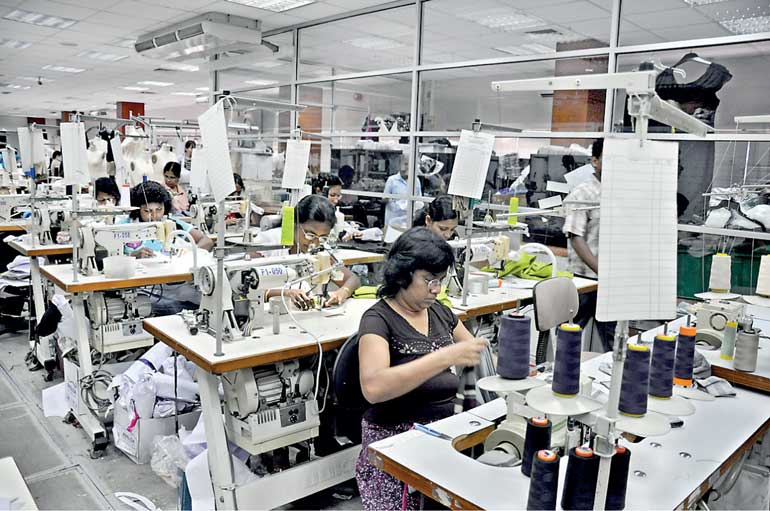Wednesday Feb 25, 2026
Wednesday Feb 25, 2026
Wednesday, 19 April 2017 00:00 - - {{hitsCtrl.values.hits}}
 Releasing a statement through labour trade unions working in Free Trade Zones, the members of the European Parliament, Anne-Marie Mineur and Lola Sánchez Caldentey, who arrived on a fact-finding mission to Sri Lanka last week to assess the country’s progress in human and labour rights compliance in relation to EU GSP+ reapplication, called on the Government to ensure that the benefits of preference given to Sri Lanka will go to workers.
Releasing a statement through labour trade unions working in Free Trade Zones, the members of the European Parliament, Anne-Marie Mineur and Lola Sánchez Caldentey, who arrived on a fact-finding mission to Sri Lanka last week to assess the country’s progress in human and labour rights compliance in relation to EU GSP+ reapplication, called on the Government to ensure that the benefits of preference given to Sri Lanka will go to workers.
“We are willing to give preferences to Sri Lanka, but only if we are sure that the benefit goes also to the workers,” Member of the European Parliament Lola Sánchez Caldentey stated.
The two MEPs insisted that collective bargaining rights should be established while stating that the right to strike should be an integral part of the fundamental rights of workers.
The main focus of the Fact Finding Mission (FMM), which took place between 10 and 12 April, was to evaluate the status of labour rights in the country, which is a primary concern for some political groups in the European Union.
According to the statement, issued through the Free Trade Zones & General Services Employees Union, the Members of the European Parliament with other members of the FFM, which includes trade union 3F of Denmark, International Transport Workers Federation (ITWF) and Clean Clothes Campaign (CCC), were invited by IndustriALL Sri Lanka Council, with the aim of evaluating the progress of the country in recent years.
As a member of the delegation, Mineur stressed that the Government was obliged to effectively guarantee the fundamental rights of workers and their trade unions.
“Collective bargaining and the right to strike should be an integral part of this,” she said.
Caldentey, who was also part of the delegation, stressed that the European Union shall not grant special trade status to Sri Lanka if the money coming from this advantage remains only in the pockets of a few businesspeople, the statement said.
“The European Union will decide in the following month whether Sri Lanka is duly entitled, or not, to be granted Generalized System of Preferences Plus status (GSP+). This status is a component of the EU policy for developing countries which offers trade incentives to those which implement core international conventions on human and labour rights, sustainable development and good governance,” the statement elaborated.
“In 2015 we received with satisfaction the commitment of the Sri Lanka Government to put in place legislation to address Human Rights violations. However, the implementation of that legislation remains very questionable,” said Mineur.
The delegation has encountered workers who have been subjected to labour rights violations, including harassment to trade unions, illegal dismissal of trade union leaders, sexual harassment and labour rights violations within the Free Trade Zones.
After the more than 10 meetings the delegates had, the mission concluded that “if the European Union consumers knew the abusive conditions under which the women do the cloth that they buy, they would be ashamed.”
“The Government must ensure that these workers can organise themselves through trade unions because otherwise they will keep on being exploited,” Mineur stated.
The delegates have also expressed their concerns about the extensive use of manpower agencies for co-working arrangements, which have undermined freedom of association and collective bargaining; and on the fact that the judiciary has increasingly been interfering in labour disputes and collective bargaining to the detriment of trade unions.
Following this fact-finding mission, the delegation met among other officials, the Minister of Labour W.D. John Seneviratne to whom they have addressed their serious concerns regarding labour rights.
The Minister has expressed his commitment to ensure that 50% of the benefits of GSP+ status will be for the workers.
“We obviously welcome this engagement, but we still don’t know how the Government will deliver this promise. We will therefore be closely following its implementation. From our perspective, the first step to make sure that the benefits go to the workers is to make sure that they get fair wages, have the effective right to organise and bargain collectively. Signing a convention is just the beginning.The real challenge is to implement it; to ensure that workers not only have the theoretical right to organise, but also that, in reality, there is no harassment towards trade unions by the employers,” the mission stated. The delegation also endorsed the trade union’s roadmap to assert labour rights in Sri Lanka as a way to ensure that workers will effectively benefit from the GSP+ status.